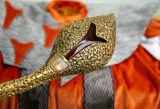In 2021, our Faculty celebrated its 20th anniversary. However, if we want to trace its very first steps, we must go back to 1992. At that time, the Institute of Foreign Languages was established at the former University of Chemical Technology in Pardubice and later (in 1995) the Institute of Languages and Humanities. Originally intended to train future language teachers, the Institute soon began to grow and offer new humanities and social sciences programmes, emphasising natural interdisciplinarity.
In 2001, the Institute was transformed into the Faculty of Humanities. Professor Milena Lenderová, who became the first Dean, recalls the historic turning point as follows:
“When, by an unfathomable twist of fate, I was appointed Head of the Institute of Languages and Humanities in September 1999, I certainly did not expect it to become a faculty. My only wish was that the ‘humanities’ would be given some concrete content. In addition to the Language and Cultural Studies programme, which later ceased to exist, we created the Cultural History programme, staffed it well (at that time, the Institute was able to bring in Petr Vorel) and then accredited it. Shortly afterwards, prof. Miroslav Ludwig was appointed Rector. He convinced us that the University of Pardubice could definitely use a fourth faculty. And indeed, this faculty was accredited and established in the beautiful Renaissance chateau in Kostelec nad Černými lesy.”
Professor Lenderová headed the newly established Faculty from 2001 to 2007. During this time, the organisational structure of the Faculty was completed, and individual departments were stabilised. Bachelor studies in most departments (six at the time, currently seven) were extended to include follow-up master’s studies, and in 2005 a doctoral programme Historical Sciences was accredited. On 1 December 2005, the Faculty was renamed as the Faculty of Arts and Philosophy. Almost two thousand students were studying at the Faculty at that time.
From 2007 to 2015, the Faculty was headed by Professor Petr Vorel and from 2015 to 2019 by Professor Karel Rýdl. During these periods, the Faculty of Arts and Philosophy of the University of Pardubice developed in many ways: It acquired the right to qualify for associate professorship and the right to appoint professors in the field of Czech and Czechoslovak History, two more doctoral programmes (Philosophy and Religious Studies) were accredited, the Department of Philosophy also managed to establish an international workplace – the Centre for Ethics as Study in Human Value – thanks to the acquisition of an important project, and in 2018 the Faculty received institutional accreditation in the Historical Sciences programme.
From this well-built environment, the remarkable achievements of individuals – both academics and students – in the field of science and art have emerged and continue to emerge. Thanks to the most productive and creative of them, we have long ranked second among the seven faculties of the University of Pardubice in terms of scientific results. We are known in the city, the region, the country and increasingly beyond its borders.
Since 1 November 2019, the new Dean of the Faculty is doc. Jiří Kubeš, who headed the Institute of Historical Sciences for many years and was the Chairman of the Academic Senate of the University of Pardubice in 2011–2013 and 2017. In his new role, he was soon faced with an even more difficult task than anyone could have imagined: Since the spring of 2020, he and his team have been leading the Faculty through a period dramatically marked by the SARS-CoV-2 coronavirus pandemic.
Commenting on this and the situation at the Faculty, the current dean remarks:
“We are in the middle of a crucial period for public higher education in the Czech Republic. In recent years, universities have begun to be evaluated in accordance with the new M17+ methodology, which takes into account the results of scientific and other creative work; we have completed the accreditation of study programmes in accordance with the amendment to the Act on Higher Education; and this year we will adopt a new Strategic Intent for the Faculty of Arts and Philosophy for the period from 2021, which will monitor and evaluate the quality of teaching, the quality of scientific and creative activity and the internationalisation of teaching and research more closely than before. All this has already led and will continue to lead to an internal qualitative transformation of the Faculty and should enhance its prestige and reputation at home and abroad. We are well on the way, and our achievements are already clearly visible. We just need to persevere and build upon active and enterprising staff and students."

